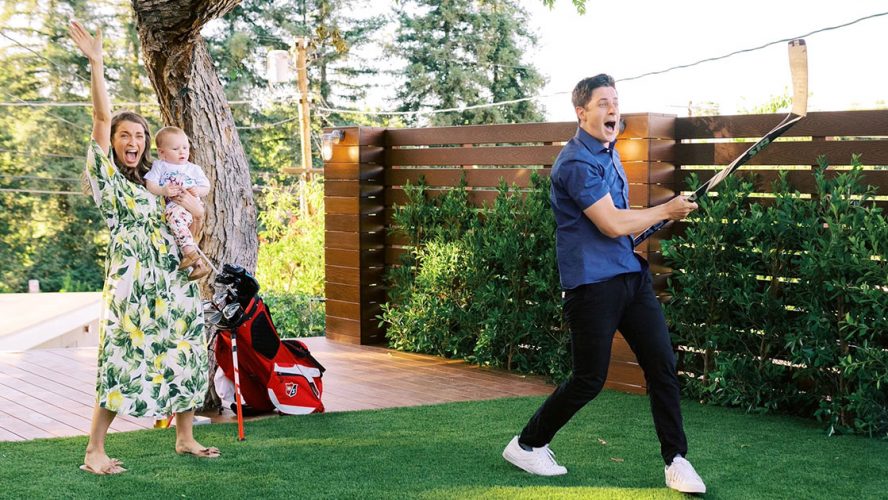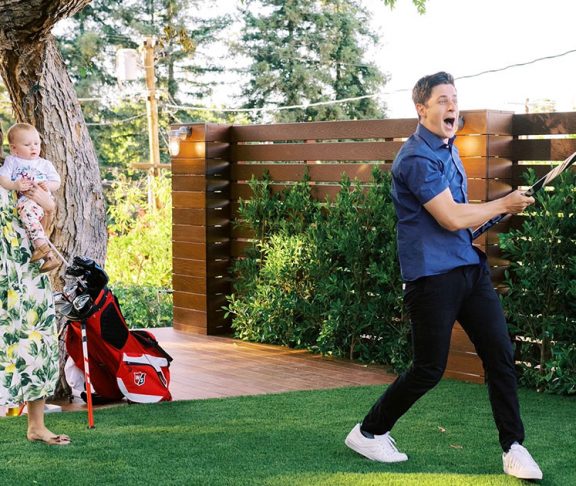On Instagram, the former Wizards of Waverly Place star documented the couple’s path to parenthood from beginning to end — including four miscarriages. In an interview, David Henrie and Maria Cahill open up about their experience, and why they’re so open with their story.
Can you share the emotions surrounding having a child after your fourth miscarriage?
Maria: My labor and delivery were very special for this baby. I had a miscarriage from Christmas Eve into Christmas day in 2019 which was very traumatic, especially considering it was my fourth one (plus, I usually love Christmas). When I went into labor on Christmas morning this past year, it felt completely surreal. I felt as though I was getting a little part of myself back, the part of myself who said over and over and over again in 2019 that sooner or later I would realize the purpose in all of the suffering, even though it wasn’t clear to me yet. When James was born Christmas night, I knew (as I did when my daughter, Pia, was born after three miscarriages) that he wouldn’t be here if I didn’t go through what I did the previous year. Needless to say, this little guy has gotten an endless amount of kisses and cuddles because I am so grateful to have him.
David, you were very outspoken and social on the day your wife was giving birth. Why was that?
David: I feel like the birthing process has been built up as this mythical mountain that few should dare to enter. When we first wanted to have children, people would speak negatively about it to me and my wife, as if wanting to dissuade us from having children at all. “Good luck buddy,” “Why would you want to do that?!” or “One and done, move on” were comments I’d all too often hear. When we had our second child, I wanted to peel back the curtain and show how profound and beautiful the process could be. The way my wife and I look at it, it’s one of nature’s gifts to humanity and one of the most primal learning lessons anyone can undergo: after the suffering comes the reward. Boy, is it worth it.
Maria, how did you feel about him documenting your journey publicly?
Maria: In hindsight, one of the hardest things for me is the fact that I never knew how common miscarriages were. Because of that, my journey, especially in the beginning, felt extremely scary and extremely lonely. Even though I don’t have social media, once David started opening up to his followers, he would read me the messages from women who were going through the same things and struggling with similar issues. I feel like when a woman is going through something as traumatic as losing their child, no matter how many weeks along, sometimes just not feeling alone in that process can be very therapeutic. One of the blessings of social media is being able to connect with people all over the world, so hopefully David sharing our journey has helped others keep that glimmer of hope needed to continue perservering.
David, you mentioned in a recent interview that you felt compelled to share your story because you didn’t realize how difficult starting a family would be. What education do you wish you had earlier in life on this topic?
David: I wish people would have stressed the idea of trying to get to know your bodies before trying to start a family. After suffering multiple miscarriages, tons of doctors visits, endless blood draws, even a minor surgery for my wife, our problem was simple: my wife has a progesterone deficiency. Once we solved that, we were able to have our two kids.
Maria, what stigmas do you feel were placed on you as a woman who has experienced several miscarriages? Are there any comments that family, friends, or fans have made that have either helped you on your journey, or negatively impacted you?
Maria: I will never forget leaving an ultrasound to confirm my second miscarriage and the technician flippantly telling me on my way out of the door, “Better luck next time.” I cringe to this day even having to write that.
As I have discovered is common with women in my situation, I went through different stages: A stage of thinking that the miscarriages were my fault, to thinking I was ”broken,” to thinking that my feelings of profound sadness shouldn’t be there at all as ”better luck next time” made it seem like it shouldn’t feel like a big deal. Yet it did. All of these thoughts, coupled by the fact that many of my friends having kids around the same time were having no issues, made for an extremely lonely experience.
Even though I had many hardships, one of the most wonderful gestures came from my sister-in-law, who gifted me with flowers on Mother’s Day, a month after my third miscarriage. There were no knowing looks thrown my way as they were handed off, just a perfect little genuine moment that made me feel that I was no less a mother.

